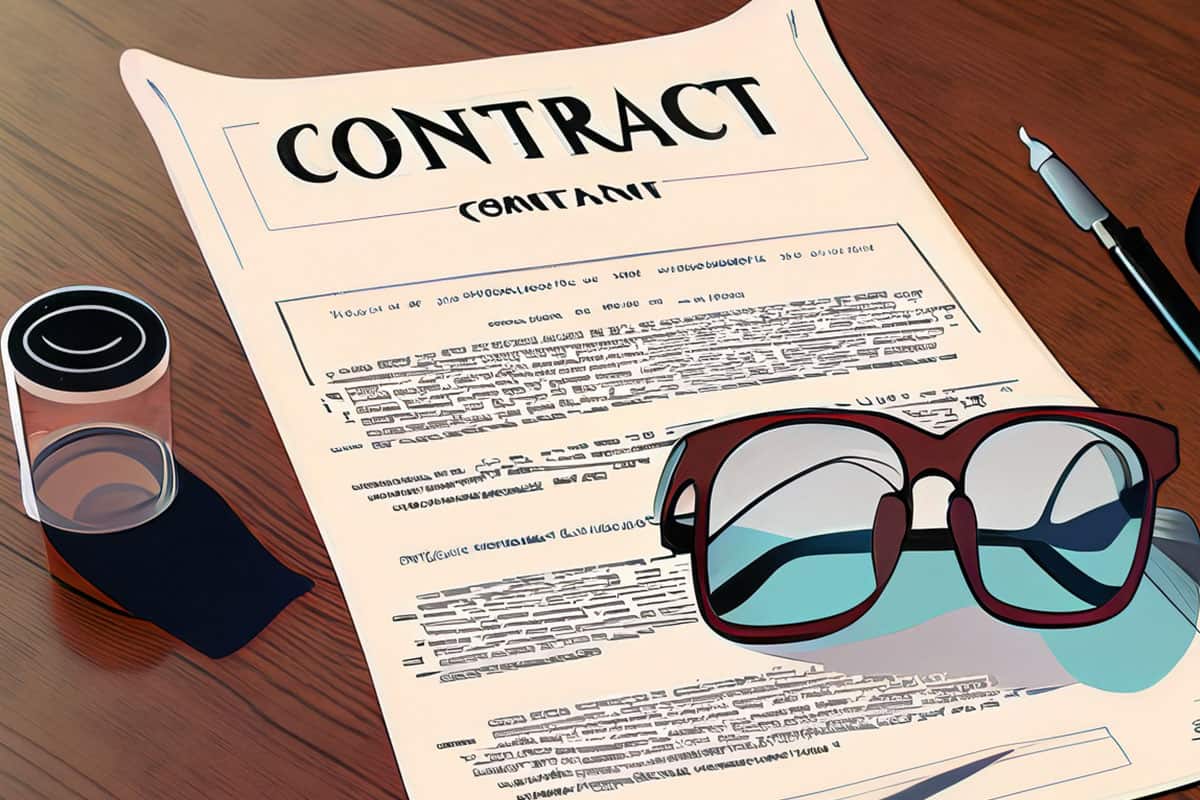Table of Contents

Navigating contracts is an essential but often daunting task for businesses.
While crafting a robust contract is a significant first step, the real work often begins after the ink has dried, ensuring contract compliance.
This comprehensive guide aims to help you demystify the concept of contract compliance, outline the processes involved, and provide best practices to help you manage contracts effectively.
What is contract compliance?
Contract compliance refers to ensuring that all parties involved in a contractual agreement adhere to the terms, conditions, and timelines laid out within the document.
It involves monitoring performance, auditing financial transactions, ensuring delivery of services, and more.
A failure in contract compliance can lead to many problems, including legal disputes, penalties, and strained business relationships.
Importance of contract compliance
Ensuring contract compliance is crucial for several compelling reasons:
Risk mitigation
Non-compliance can result in severe financial losses and legal complications. For example, if a supplier fails to deliver goods on a predetermined date, it can disrupt an entire supply chain, leading to delays in production and possibly causing the company to miss market opportunities. Additionally, non-compliance with regulatory requirements, like GDPR in the case of data protection, can lead to hefty fines and legal repercussions.
Resource optimisation
Compliance ensures that resources, whether time, money, or staffing, are used as agreed upon, leading to operational efficiency. If a company outsources its customer service operations, the service provider must comply with the contract’s stipulations, such as response time and quality of service. The company can focus its internal resources on core business activities like product development or marketing and maximising operational efficacy.
Relationship building
Consistent compliance fosters trust between the contractual parties, enhancing long-term business relations. When a software development firm consistently adheres to timelines and delivers quality code, it satisfies the immediate project requirements. It builds a track record of reliability, which could result in the client considering the firm for more significant projects or long-term contracts.
Enhanced reputation
In a business environment where news travels fast, compliance contributes to building a solid reputation. For instance, a construction company that strictly adheres to safety protocols and timelines in its projects will likely gain a reputation for reliability and integrity, attracting more clients in the long run.
Competitive advantage
In highly competitive markets, being a company known for strict contract compliance can serve as a unique selling proposition (USP). Customers and partners often seek reliability and might be willing to pay a premium. By excelling in contract compliance, a business can differentiate itself from competitors who may be lax.
By understanding and appreciating the total weight of these implications, companies are better positioned to enforce contract compliance as a priority, not an afterthought.

The contract compliance process
Contract compliance is not a one-off task but a continuous cycle that typically includes:
Phase 1: Pre-contract assessment
- Requirement analysis: Understand the requirements and objectives that the contract aims to fulfil.
Phase 2: Contract creation
- Drafting: Use clear language to outline obligations, responsibilities, and terms.
Phase 3: Contract execution
- Monitoring: Continually assess performance against agreed-upon terms.
- Documentation: Keep thorough records of all activities, changes, and compliance checks.
Phase 4: Audit and review
- Audit: Regularly check for discrepancies between contract terms and actual performance.
- Review: Assess the contract’s efficacy and whether it meets its objectives.
Best practices for contract compliance
- Leverage technology: Utilise contract management software to automate mundane tasks.
- Clear communication: Keep all parties informed about their roles and responsibilities.
- Regular audits: Make audits a regular activity rather than a reactionary measure.
- Training: Ensure that team members understand the contract terms and the importance of compliance.
How to use Zegal to stay compliant
While the above best practices provide a framework for contract compliance, implementing them can be challenging without the right tools.
This is where Zegal comes into the picture.
Create standardised templates
Creating standardised contract templates is one of the most effective ways to ensure contract compliance across the board.
Standardised templates provide a cohesive framework that can be adapted to various situations, streamlining the process and reducing the risk of oversight or error.
Uniformity in language and structure
Standardised templates maintain a consistent language and structural format, making it easier for all parties to understand their obligations and responsibilities.
This uniformity simplifies the review and auditing processes, speeding up compliance checks.
Time efficiency
Using templates saves valuable time over drafting contracts from scratch.
This efficiency can be particularly beneficial in fast-paced business environments where contracts must be finalised quickly.
Reduced risk of omissions
Standard templates often include essential clauses and conditions that might be overlooked when drafting individual contracts.
These could include compliance-related stipulations, such as penalty clauses for late delivery or non-compliance with specific regulations, thereby embedding compliance into the contract from the get-go.
Easy updates for regulatory compliance
Laws and regulations change over time, and contracts must adapt to remain compliant. With standardised templates, any necessary updates for new regulations can be made in one place and then rolled out across all contracts, making it easier to maintain compliance.
Standardising contract templates is made incredibly straightforward with Zegal. The platform offers a library of customisable legal documents that adhere to legal best practices.
Automated compliance checks
Zegal’s platform offers automated compliance checks that serve as a proactive approach to contract management.
Traditionally, compliance checks often require a dedicated team to pore over contracts, cross-referencing stipulations, and performance reports. This process is time-consuming and susceptible to human errors, which could result in significant financial and reputational risks.
Zegal addresses these challenges by automating this critical function. For example, you have an employment contract stipulating regular performance reviews. Zegal’s system can automatically flag upcoming review dates, prompting responsible parties to take action. It can also cross-check deliverables against performance data to ensure all contractual obligations are met.
By automating these checks, Zegal allows businesses to allocate their resources more efficiently, ensuring compliance without the overhead of manual auditing.
Real-time monitoring
One of the most significant advantages of Zegal’s platform is the ability to monitor contract performance in real time.
In traditional contract management, lag times between performance, reporting, and auditing can often lead to issues being identified long after they’ve occurred. These delays can result in breaches of contract, financial losses, or legal disputes.
With Zegal, however, you can have a real-time overview of all contractual obligations and their corresponding statuses.
You will know almost instantly if a payment is missed or a deliverable is late. This real-time information enables you to act swiftly, potentially averting more significant issues.
You can also set up alerts for key performance indicators (KPIs) or crucial deadlines to ensure nothing falls through the cracks.
Digital record-keeping
Document management is a core aspect of contract compliance, but traditional methods involving physical files or disparate digital documents could be more convenient and efficient.
Zegal revolutionises this aspect with its centralised dashboard for digital record-keeping. Here, you can securely store contracts, amendments, compliance reports, and other pertinent documents in one place.
The platform also offers advanced search features, allowing you to retrieve documents or specific clauses within seconds. This ease of access is beneficial during audits or reviews where timely information retrieval is of the essence.
Furthermore, the digital storage system is encrypted and compliant with data protection regulations, ensuring your sensitive information remains secure. IAM Resilience platform helps you to keep your sensitive information in safe storage.
By embracing automated compliance checks, real-time monitoring, and digital record-keeping, Zegal significantly simplifies the contract compliance process. These features allow you to stay ahead of potential issues, streamline administrative tasks, and focus on strategic aspects of your business.
Ensuring compliance with Zegal
Contract compliance is a crucial aspect of successful contract management.
Companies can mitigate risks, improve operational efficiency, and strengthen business relationships by understanding its nuances, adopting best practices, and leveraging tools like Zegal.
With its suite of features designed to simplify and enhance contract management, Zegal offers a one-stop solution for all your contract compliance needs.
Tom Odlin
Tom is a dynamic marketing professional passionate about legal technology and the web. With extensive experience driving marketing strategies and leveraging cutting-edge tech innovations, Tom enhances brand visibility and engagement. Tom has been writing about business and legal topics for the better part of a decade.






